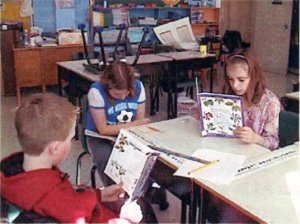
The grade four teachers' reflections revealed that they viewed implementing literature circles as a very worthwhile experience and they would continue the strategy. In particular, they acknowledged that they liked the interactions and discussions that took place; they were impressed with the questions the students came up with to lead the discussion; and they liked the option of incorporating informational texts with the science curriculum. They also noted that boys tended to choose novels about sports while girls tended to choose novels about animals. They realized that they needed to do more modeling on summarizing and that the students had difficulty making connections to their reading. The teachers were surprised that the students felt they had control over what they read by giving them choices; that the students didn't seem to be influenced by their friends when making book choices; and that the students never asked to be placed in a different group.

Finally, they made the following
recommendations: incorporating the use of
literature circles in a center format some of
the time (one group participating in a
literature circle at a time); using one novel
and a short story per term as opposed to
two novels; and assigning some of the
project work for homework when necessary
to avoid using too much class time.
The researchers valued the feedback from the teachers. At the same time, based on observations and data gathered by the researchers, the objectives for the following year included assisting the students in moving towards 'grand' and more natural conversations about books, giving greater purpose to the Word Wizard role, improving abilities to summarize, encouraging students to refer back to the text to support their comments, assisting students with developing their connections to what they are reading, and reducing the class time for extension projects.